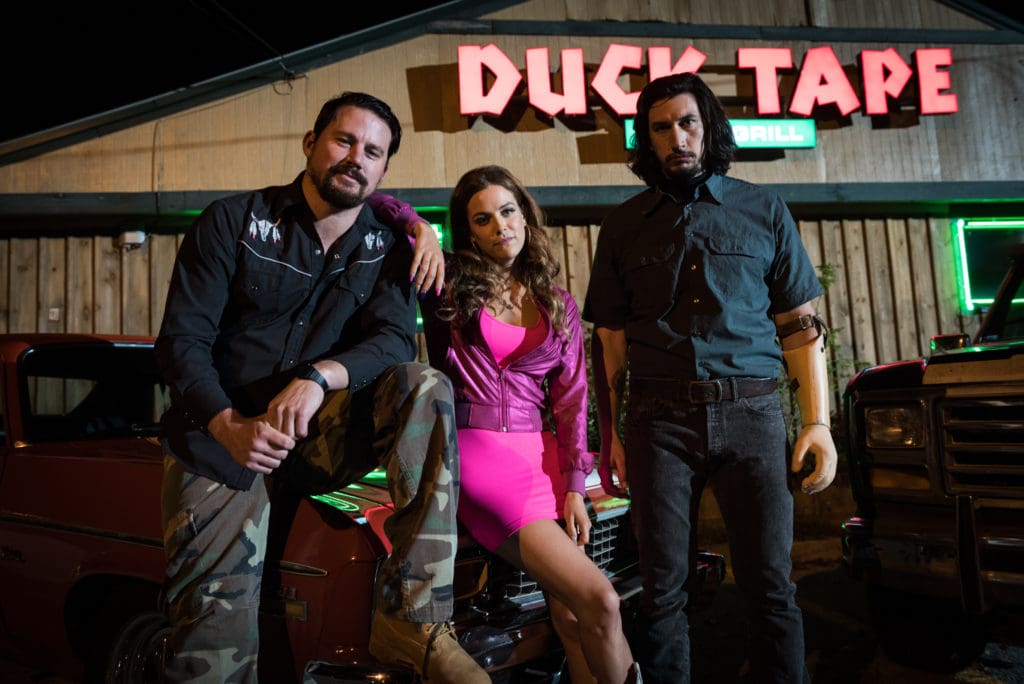
Four years ago, director Steven Soderbergh left movies behind to make critically-acclaimed television instead. Now, he returns to the big screen with Logan Lucky, a heist film that’s like a country fried version of some of his biggest hits. However, while Danny Ocean and his cohorts were high-class, international thieves, Jimmy and Clyde Logan (Channing Tatum and Adam Driver, respectively) are blue collar workers in West Virginia who decide to rob the vault at the Charlotte Motor Speedway.
Written by first-time screenwriter Rebecca Blunt (who may not be a real person, but let’s assume that she is for the purposes of this discussion), the story shares a lot with the Ocean’s franchise. There’s snappy dialogue, memorable characters and a tricky narrative structure, but there’s also a surprising strain of earnestness. Blunt grew up in Logan, West Virginia in a family that spent generations working in local coal mines and you can feel that experience onscreen. Some if it is in the details, like the way Jimmy and Clyde’s sister, Mellie (Riley Keough), rattles off the complicated list of highways she took to deliver Jimmy’s daughter to her beauty pageant. Much of it, though, is conveyed through the way the characters are treated.
Two examples in particular stand out. The first comes when a doctor named Sylvia (Katherine Waterston) in a mobile medical trailer talks Jimmy into getting a tetanus shot and then slowly reveals that they may have known each other in high school. With just a few lines and a healthy serving of chemistry, Tatum and Waterston create whole histories for their characters, quickly giving the performances and the characters’ world a sense of fidelity.
The second comes later when–in a callback to the film’s opening scene–Jimmy’s daughter, Sadie (Farrah Mackenzie), surprises everyone by changing her pageant song from Rihanna’s “Umbrella” to John Denver’s “Take Me Home, Country Roads.” Though the girl chooses the song because it’s her father’s favorite, the meaning shifts as the pageant audience’s voices slowly join hers, turning it into a pure moment of state (and by extension, American) pride that perhaps only a fellow Mountaineer can fully understand.
Both moments are simple and meaningful and they feel authentic because of it. That said, the actors are instrumental in making those moments land as well as they do. Admittedly, Tatum has an advantage since Blunt wrote the character as a sort of alternate timeline version of the actor. He gives Jimmy a quiet, somewhat beaten down pride here that makes it easy to believe he’s just a normal blue collar guy with the beginnings of a beer belly. As members of showbiz families, Waterston and Keough perhaps have to do a little more work to deliver their all-American vibes (though the latter possibly less so as the granddaughter of Elvis), but they’re just as convincing.
In fact, the only performance that doesn’t quite work is Daniel Craig as Joe Bang. On some level, Craig can’t necessarily be blamed for wanting to have a little fun. Joe is eccentric, but he’s also a competent explosives expert. The problem lies in the tone. Joe (and to an even bigger degree, his brothers) is supposed to come off as a hick, but it’s not entirely clear whether that characterization is loving or mocking. Regardless, the character doesn’t mesh tonally with the rest of the characters, but that dissonance is only part of the reason the film feels so uneven.
What makes the Ocean’s trilogy so much fun is the way it feels like it’s constantly tricking the audience, surprising them with how clever the criminals are. Blunt attempts to do the same here, but it’s harder to believe because the movie so frequently depicts the characters as dunces. Take the moment in the middle of the heist when Jimmy and the Bang brothers argue about the “moral” reasons for pulling off the robbery. It’s supposed to be funny, but it comes off as a time-wasting tactic to keep us from noticing that the robbery isn’t all that complex. Worse, when the ultimate trick is finally revealed, it feels like a letdown because we spend too much time focusing on the build-up and the aftermath.
What made Soderbergh’s previous heist films so enjoyable was the sense that they were meticulously constructed, like an expensive time-piece. Logan Lucky, on the other hand, feels like a cheap knockoff. That said, the film has some wonderful moments. However, none of them have to do with the heist. Instead, they’re the character beats in between. Shame they couldn’t be trusted to stand on their own without all the backwoods, safe-cracking shenanigans.

